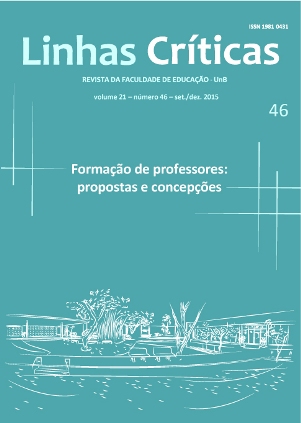Teaching grammar/ linguistic analysis: a teacher, multiple practices
DOI:
https://doi.org/10.26512/lc.v21i46.4714Keywords:
Teaching of portuguese language;, Linguistic analysis;, Teaching knowledge;, Teaching practicesAbstract
The article analyses practices of grammar teaching / linguistic analysis developed by a teacher of the 6th year of middle school. Drawing on theoretical frameworks related to the teaching of grammar / linguistic analysis and knowledge and teaching practices, it was demonstrated, through classroom observations and interviews, the existence of a movement between continuity and change in the teaching practices observed, which materialized through the following aspects: the use of textbooks and the relationship that the teacher had with this resource; the emphasis on working with reading and text production; the articulation between of axes teaching; and the approach of grammatical content.
Downloads
References
ANTUNES, Irandé. Aula de português: encontro e interação. São Paulo: Parábola editorial, 2003.
ANTUNES, Irandé. Muito além da gramática: por um ensino de línguas sem pedras no caminho. São Paulo: Parábola editorial, 2007.
BARDIN, Laurence. Análise do conteúdo. Lisboa: Edições 70, 1977.
BRASIL. Guia de livros didáticos; PNLD 2011: Língua Portuguesa -. Brasília: Ministério da Educação, Secretaria de Educação Básica, 2010.
BUSNARDO, Flávia; LOPES, Alice Casimiro. Os discursos da comunidade disciplinar de ensino de biologia: circulação em múltiplos contextos. Ciência & Educação, Bauru, v. 16, n. 1, pp. 87-102, 2010.
CEREJA, William Roberto, MAGALHÃES, Tereza Cochar. Português: Linguagens, 6.º ano. 5. ed. reformulada. São Paulo: Atual, 2009, p. 115.
CERTEAU, Michel de. A invenção do cotidiano: 1. Artes de fazer. Tradução Ephraim Ferreira Alves. Petrópolis, RJ: Vozes, 1994.
CHARTIER, Anne-Marie. Fazeres ordinários da classe: uma aposta para pesquisa e para a formação, Educação e Pesquisa. São Paulo, v. 26, n. 2, pp. 157-168, jul./dez. 2000.
CHARTIER, Anne-Marie. Ensinar a ler e escrever, entre teoria e prática. V Semana da Educação, da Fundação Victor Civita. São Paulo: 2010. 20p. Disponível em: <http://revistaescola.abril.com.br/pdf/texto-anne-marie-chartier.pdf>. Acesso em: 10 dez. 2012.
GERALDI, João Wanderley (org.). O texto na sala de aula. 3. ed. São Paulo: Ática, 2003.
MARINHO, Marildes. A Língua Portuguesa nos currículos de final de século. In: BARRETO, Elba de Sá et al. Os currículos do ensino fundamental para as escolas brasileiras. Campinas: Autores Associados; São Paulo: Fundação Carlos Chagas, 1998, pp. 43-90.
LÜDKE, Menga. A pesquisa em educação ao encontro de sua complexidade. In: SILVA, Aida Maria M. et al. (Org.). Educação formal e não formal, processos formativos e saberes pedagógicos: desafios para a inclusão social. In: ENCONTRO NACIONAL DE DIDÁTICA E PRÁTICA DE ENSINO, 13., Recife, 2006. Anais... Recife, 2006.
LÜDKE, Menga; ANDRÈ, Marli Elisa Dalmazo Afonso de. Pesquisa em educação: abordagens qualitativas. São Paulo: EPU, 1986.
MATTOS E SILVA, Rosa Virgínia. Contradições no ensino do português: a língua que se fala X a língua que se ensina. 7. ed. São Paulo: Contexto, 2011.
MENDONÇA, Márcia. Análise linguística no ensino médio: um novo olhar, um outro objeto. In: BUNZEN; Clécio; MENDONÇA, Márcia (orgs.). Português no ensino médio e formação do professor. São Paulo: Parábola, 2006, pp.199-226.
MENDONÇA, Márcia. Análise linguística: por que e como avaliar. In: MARCURSCHI, Beth; SUASSUNA, Lívia (orgs.). Avaliação em língua portuguesa: contribuições para a prática pedagógica. Belo Horizonte: Autêntica, 2007. pp. 95-109.
MORAIS, Artur Gomes. Mostro à solta ou... “Análise Linguística” na escola: apropriações de professoras das séries iniciais ante as novas prescrições para o ensino de “Gramática”. In: Reunião Anual da ANPEd, 25, Caxambu, 2002, Anais.... Caxambu, ANPEd, pp. 1-16. 2002.
MORAIS, Artur. Gomes; SILVA, Alexsandro da. Produção de textos escritos e análise linguística na escola. In: LEAL, Telma Ferraz; BRANDÃO, Ana Carolina Perrusi. (orgs.). Produção de textos na escola: reflexões e práticas no Ensino Fundamental. Belo Horizonte: Autêntica, 2007.
NEVES, Maria Helena de M. Que gramática ensinar na escola? Norma e uso na Língua Portuguesa. São Paulo: Contexto, 2003.
ROSA, Maria Virgínia de Figueirdedo do Couto; ARNOLDI, Marlene Aparecida Gonzales Colombo . A entrevista na pesquisa qualitativa: mecanismo para validação dos resultados. Belo Horizonte: Autêntica, 2008.
SETT, Maria das Graças et al. Para ler o mundo. Língua portuguesa - 6.º ano. São Paulo: Scipione, 2009.
SOARES, Magda. Concepções de linguagem e o ensino da Língua Portuguesa. In: BASTOS, Neusa Barbosa (org.). Língua Portuguesa: história, perspectivas, ensino. São Paulo: Educ., 1998, pp. 53-60.
SILVA, Vanessa Souza da; CYRANKA, Lúcia Furtado de Mendonça. A Língua Portuguesa na escola ontem e hoje. Linhas Críticas, Brasília, v. 14, n. 27, pp. 271-287, jul/dez, 2009.
TARDIF, Maurice. Saberes profissionais dos professores e conhecimentos universitários – Elementos para uma epistemologia da prática profissional dos professores e suas consequências em relação à formação do magistério. Revista Brasileira de Educação, Rio de Janeiro, ANPEd, n. 13, pp. 5-24, jan/fev/mar/abr. 2000.
TARDIF, Maurice; RAYMOND, Danielle. Saberes, tempo e aprendizagem do trabalho no magistério. Educação & Sociedade, Campinas, vol. 21, n. 73, pp. 209-244, dez. 2000.
Downloads
Published
How to Cite
Issue
Section
License
Copyright (c) 2016 Linhas Críticas

This work is licensed under a Creative Commons Attribution 4.0 International License.
Authors who publish in this journal agree to the following terms:
-Authors maintains the copyright and grants the journal the right of first publication, the work being simultaneously licensed under the Creative Commons Attribution License which allows the sharing of the work with recognition of the authorship of the work and initial publication in this journal.
- Authors are authorized to enter into additional contracts separately, for non-exclusive distribution of the version of the work published in this journal (eg publish in institutional repository or as a book chapter), with acknowledgment of authorship and initial publication in this journal.
-Authorers are allowed and encouraged to publish and distribute their work online (eg in institutional repositories or on their personal page) at any point before or during the editorial process, as this can generate productive changes as well as increase the impact and the citation of published work (See The Effect of Free Access).



